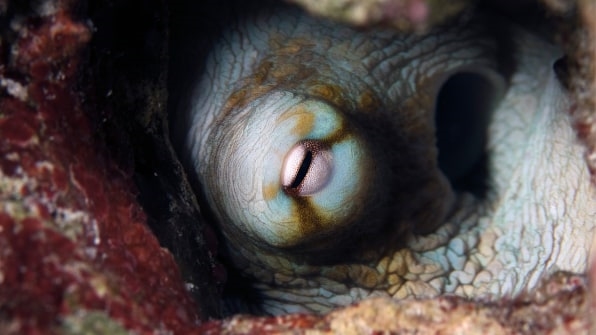By Brian Kateman
A seafood company known as Nueva Pescanova is hoping to open the world’s first-ever large-scale octopus farm in Spain’s Canary Islands. You might be surprised that it hasn’t happened already, given the global popularity of octopus-based dishes. Octopus, eaten cooked or raw, and sometimes while still alive, is an adored culinary delicacy in many regions throughout Europe, east Asia, and northern Africa.
Or maybe you’re surprised that it’s happening at all, especially right now, when octopus sentience has become a fairly mainstream topic of conversation. A number of books on the matter have been published in recent years, like Sy Montgomery’s The Soul of an Octopus and Peter Godfrey-Smith’s Other Minds: The Octopus, the Sea, and the Deep Origins of Consciousness. The 2021 Oscar winner for Best Documentary Feature, My Octopus Teacher, seemed to generate more buzz than the entire documentary category does most years.
These materials have shed light on the fascinating behavior and mental capacity of the tentacled sea creature, while exploring the blurry line between humans and other animals. Some viewers even criticized the makers of My Octopus Teacher for not being more respectful of the octopus. Given the octopus’s sophisticated mental abilities, it seems exploitative to follow, film, and arguably harass the animal to the point of endangerment for an entire year, they asserted. Suffice it to say, the thoughts, feelings, and capabilities of octopuses have been on people’s minds—and not just marine biologists.

If you’re an octopus sympathizer, the idea of commercial octopus farming might cause a pit in your stomach. It certainly does for me—because we have significant evidence suggesting the social and emotional complexity of octopuses. Scientists have observed them forming complex societies, complete with hierarchies and land disputes.
We can say with confidence that the octopus is sentient, capable of both bodily sensation and emotion. A 2021 review of evidence by the London School of Economics affirmed that cephalopods (like octopuses and squids) and decapods (crabs, shrimp, lobsters, etc.) meet the criteria for sentience on several different accounts. They possess the neurological hardware necessary to experience pleasure and pain. They have surprisingly advanced problem-solving skills. And they’re capable of learning in a way that cannot be mistaken for mere behavioral conditioning.
Currently, the most common means of slaughtering octopuses are clubbing, suffocation, and slicing open the brain. The authors of the 2021 review find all of these methods to be unambiguously inhumane. If there are other, more humane methods, we’ve yet to see how they could be implemented at scale in a for-profit aquaculture program.
Regardless of a factory farm’s conditions, life in captivity is inherently incompatible with the way octopuses live and interact. While they are capable of developing cooperative relationships, they need their space. When overcrowded, they’ve been known to attack and even cannibalize each other. Because octopuses are so intelligent, developing systems that effectively contain them—let alone provide adequate stimulation—will likely be complex and expensive.
Nueva Pescanova insists that it is committed to farming octopuses responsibly and sustainably. However, it plans to confine them in communal tanks and in constant light—though the sea creatures are used to dark environments. The company also asserts that their planned method of slaughter—submerging the octopuses in ice-cold water—“involves proper handling that avoids any pain or suffering to the animal.” Yet research suggests that this method of live chilling sea creatures is “highly questionable” and can cause severe pain and stress.
If animals can experience suffering, that’s reason enough to protect them from suffering. We already largely agree that this includes mammals (like cows) and birds (like chickens) who share similar biology to us and who we know feel pain. But especially given its intelligence, the cognitive dissonance required to both love and kill an octopus is significant, particularly compared with other invertebrates (though there is increasing reason to be concerned about insect welfare as well). Although it can be challenging to know exactly where to draw the line (some vegans happily eat oysters, for example), it seems that seeing an octopus lean into a researcher’s gentle pets and then turning around and seeing one on the menu should cause emotional discomfort.
Given the marvelous, ever-fascinating view of octopuses that’s permeated media in recent years, Nueva Pescanova shouldn’t be surprised if it’s met with outrage not only from animal rights activists but also from the general public.
The role of animal agriculture in our world is complicated, full of competing philosophies and cultural practices. But to begin farming octopuses with full knowledge of their capacity for experience is just unacceptable. We know that it would cause immense, horrific suffering to animals that are very capable of feeling pain. We can’t simply pretend that there are no ethical issues to consider. We know better. And if our own species is as capable of reasoning and empathy as we think we are, we won’t let octopus farming become a new norm.
(60)